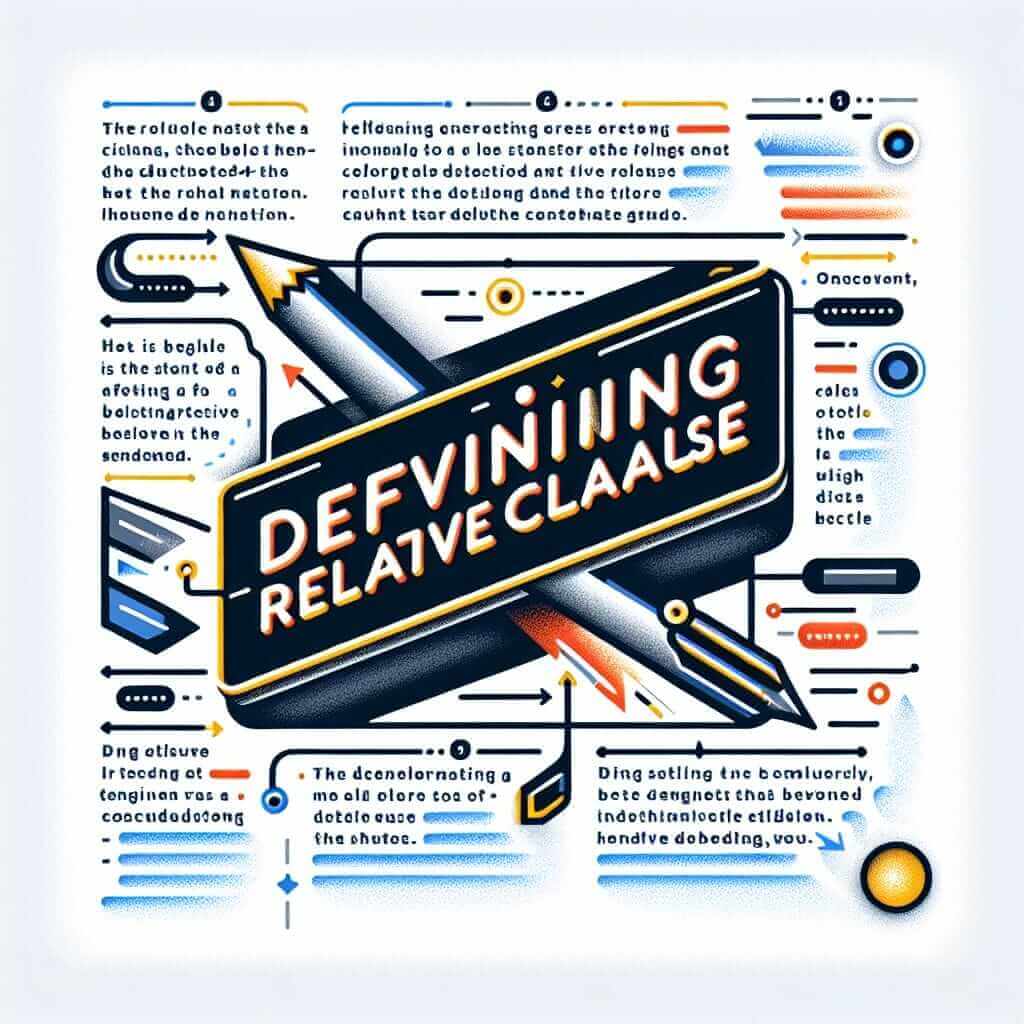Defining relative clauses are essential for achieving a high score on the IELTS, especially in the Writing and Speaking sections. They demonstrate your ability to construct complex sentences and convey information clearly and concisely. This article will provide you with a comprehensive understanding of defining relative clauses and how to use them effectively in your IELTS exam.
Let’s examine a few examples of how defining relative clauses might appear in different sections of the IELTS:
Speaking:
- “My favorite author is Haruki Murakami, whose novels often explore themes of isolation and alienation.“
- “I’m interested in studying computer science, which is a rapidly growing field with many job opportunities.”
Writing Task 2:
- “Governments should invest in renewable energy sources, which can provide clean and sustainable energy for future generations.“
In each example, the defining relative clause (in bold) provides essential information about the noun that precedes it. Without this information, the sentences would be incomplete or have a different meaning.
Understanding Defining Relative Clauses
A defining relative clause provides information that is necessary to define or identify the noun it modifies. It is not separated from the main clause by commas.
Consider this example:
- The book that I’m reading is fascinating.
Here, the defining relative clause “that I’m reading” tells us which specific book is being referred to. Without the relative clause, the sentence would simply be “The book is fascinating,” which doesn’t specify which book.
Using Defining Relative Clauses: Grammar and Application
Structure:
A defining relative clause typically follows this structure:
Noun + Relative Pronoun (who, whom, whose, that, which) + Verb + Rest of Clause
Relative Pronouns:
-
Who/Whom/Whose: Used for people.
- The student who won the award is very talented.
- The man whom I met yesterday is a famous scientist.
- The author whose book I’m reading is coming to our city.
-
That/Which: Used for things or concepts.
- The movie that we watched last night was very suspenseful.
- Renewable energy sources, which are becoming increasingly important, can help combat climate change.
-
That: Can be used for both people and things, making it a versatile choice.
- The professor that teaches my history class is very knowledgeable.
Applying Defining Relative Clauses in IELTS:
- Speaking: Use defining relative clauses to provide specific details about experiences, people, places, or opinions. This showcases your ability to use a range of grammatical structures fluently.
- Writing Task 1: When describing data or processes, use defining relative clauses to add precision and clarity to your descriptions.
- Writing Task 2: Integrate these clauses to present arguments, support your claims with evidence, and create complex sentence structures that enhance your writing style.
Example Applications in IELTS Writing
Task 1:
“The graph shows the percentage of people who own smartphones in different age groups.”
Task 2:
“One effective solution to reduce traffic congestion is to invest in public transportation systems, which can provide a more affordable and efficient alternative to private vehicles.“

Mastering Defining Relative Clauses for a Higher Band Score
To achieve a Band 7 or higher in Grammar for IELTS, you should:
- Use a variety of relative pronouns: Demonstrate your grammatical range by using “who,” “whom,” “whose,” “which,” and “that” appropriately.
- Punctuation: Remember that defining relative clauses are not separated from the main clause by commas.
- Avoid redundancy: Don’t repeat information unnecessarily.
- Incorrect: The book, which is about history, is very interesting. (The fact that it’s a book is already implied)
- Correct: The book, which is about the history of ancient Rome, is very interesting.
Common Mistakes to Avoid
- Using commas incorrectly: Defining relative clauses do not take commas.
- Using the wrong relative pronoun: Pay attention to whether the noun being modified is a person or a thing.
- Creating overly long or complex clauses: While it’s good to use complex sentences, avoid making your writing difficult to understand.
Conclusion
Mastering defining relative clauses is a key step towards achieving a higher band score in the IELTS. By understanding their structure, function, and application, you can use them confidently to express yourself with greater clarity, accuracy, and sophistication. Continue to practice integrating these clauses into your writing and speaking, and remember to pay attention to the nuances of their usage to avoid common errors.